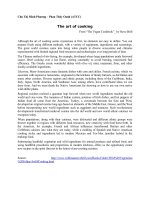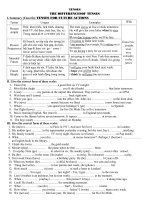The guests of hercules
Bạn đang xem bản rút gọn của tài liệu. Xem và tải ngay bản đầy đủ của tài liệu tại đây (1.68 MB, 404 trang )
TheProjectGutenbergEBookofTheGuestsOfHercules,by
C.N.WilliamsonandA.M.Williamson
ThiseBookisfortheuseofanyoneanywhereatnocostandwith
almostnorestrictionswhatsoever.Youmaycopyit,giveitawayor
re-useitunderthetermsoftheProjectGutenbergLicenseincluded
withthiseBookoronlineatwww.gutenberg.org
Title:TheGuestsOfHercules
Author:C.N.WilliamsonandA.M.Williamson
Illustrator:M.LeoneBrackerandArthurH.Buckland
ReleaseDate:October18,2006[EBook#19569]
Language:English
***STARTOFTHISPROJECTGUTENBERGEBOOKTHEGUESTSOFHERCULES***
ProducedbyChrisNash,SuzanneShellandtheOnline
DistributedProofreadingTeamat
BooksbyC.N.andA.M.WILLIAMSON
Frontispiece
TitlePage
Dedication
ListofIllustrations
I
XI
XXI
XXXI
II
XII
XXII
XXXII
III
XIII
XXIII
XXXIII
IV
XIV
XXIV
XXXIV
V
XV
XXV
XXXV
VI
XVI
XXVI
XXXVI
VII XVII
XXVII
XXXVII
VIII
IX
X
XVIII
XIX
XX
XXVIII
XXXVIII
XXIX
XXXIX
XXX
TheEnd
Transcriber'sNotes
BooksbyC.N.andA.M.WILLIAMSON
THEGOLDENSILENCE
THEMOTORMAID
LORDLOVELANDDISCOVERSAMERICA
SETINSILVER
THELIGHTNINGCONDUCTOR
THEPRINCESSPASSES
MYFRIENDTHECHAUFFEUR
LADYBETTYACROSSTHEWATER
ROSEMARYINSEARCHOFAFATHER
THEPRINCESSVIRGINIA
THECAROFDESTINY
THECHAPERON
"Marywasagoddessonagoldenpinnacle.Thiswaslife;thewineoflife"
"MARYWASAGODDESSONAGOLDENPINNACLE.THISWASLIFE;THEWINEOFLIFE"
THE
GuestsofHercules
BY
C.N.andA.M.WILLIAMSON
anchorornament
ILLUSTRATEDBY
M.LEONEBRACKER&ARTHURH.BUCKLAND
GARDENCITYNEWYORK
DOUBLEDAY,PAGE&COMPANY
1912
Copyright,1912,by
C.N.&A.M.WILLIAMSON
Allrightsreserved,includingthatof
translationintoForeignLanguages,
includingtheScandinavian
TO
THELORDOFTHEGARDEN
ILLUSTRATIONS
"Marywasagoddessonagoldenpinnacle.Thiswaslife;the
wineoflife"
Frontispiece
FACINGPAGE
MaryGrant
22
"'Ican'tpromise!'sheexclaimed.'I'veneverwantedtomarry.'"
286
"'ItwasFatebroughtyou—togiveyoutome.Doyouregretit?'" 398
I
THEGUESTSOFHERCULES
Long shadows of late afternoon lay straight and thin across the garden path;
shadows of beech trees that ranged themselves in an undeviating line, like an
innerwallwithintheconventwallofbrick;andthesoaringtreeswereveryold,
asoldperhapsastheconventitself,whosestonehadthesamesofttintsoffaded
redandbrownastheautumnleaveswhichsparselyjewelledthebeeches'silver.
Atallgirlinthehabitofanovicewalkedthepathalone,movingslowlyacross
the stripes of sunlight and shadow which inlaid the gravel with equal bars of
blackandreddishgold.Therewasasmellofautumnonthewindlessair,bitter
yetsweet;thescentofdyingleaves,andfadingflowerslothtoperish,ofroseberriesthathadusurpedtheplaceofroses,ofchrysanthemumschilledbyfrost,
ofmoistearthdeprivedofsun,andofthegreenmoss-likefilmovergrowingall
thetrunksoftheoldbeechtrees.Thenovicewassayinggoodbyetotheconvent
garden, and the long straight path under the wall, where every day for many
yearsshehadwalked,springandsummer,autumnandwinter;daysofrain,days
of sun, days of boisterous wind, days of white feathery snow—all the days
throughwhichshehadpassed,onherwayfromchildhoodtowomanhood.Best
of all, she had loved the garden and her favourite path in spring, when vague
hopes likedreamsstirredin herblood,whenitseemedthatshecouldhear the
whisperofthesapintheveinsofthetrees,andthecrispstirofthebudsasthey
unfolded. She wished that she could have been going out of the garden in the
brightnessandfragranceofspring.Theyoungbeautyoftheworldwouldhave
been a good omen for the happiness of her new life. The sorrowful incense of
Nature indecay castaspellofsadnessoverher,evenoffear,lestafterallshe
weredoingawrongthing,makingamistakewhichcouldneverbeamended.
Thespiritofthepastlaidahanduponherheart.Ghostsofsweetdaysgonelong
agobeckonedherbacktothelandofvanishedhours.Thegardenwasthegarden
ofthepast;forhere,withinthehighwallsdrapedinfloweringcreepersandivy
oldashistory,past,present,andfuturewereallasone,andhadbeensoformany
a tranquil generation of calm-faced, dark-veiled women. Suddenly a great
homesicknessfelluponthenovicelikeanironweight.Shelongedtorushinto
thehouse,toflingherselfatReverendMother'sfeet,andcryoutthatshewanted
totakebackherdecision,thatshewantedeverythingtobeasithadbeenbefore.
Butitwastoolatetochange.Whatwasdone,wasdone.
Deliberately,shehadgivenupherhome,andallthekindwomenwhohadmade
theplacehomeforher,fromthetimewhenshewasachildeightyearsolduntil
now, when she was twenty-four. Sixteen years! It was a lifetime. Memories of
her child-world before convent days were more like dreams than memories of
realthingsthathadbefallenher,MaryGrant.Andyet,onthisherlastdayinthe
convent, recollections of the first were crystal clear, as they never had been in
theyearsthatlaybetween.
Her father had brought her a long way, in a train. Something dreadful had
happened,whichhadmadehimstoplovingher.Shecouldnotguesswhat,for
shehaddonenothingwrongsofarassheknew:butafewdaysbefore,hernurse,
akindoldwomanofacomfortablefatness,hadputherintoaroomwhereher
father was and gently shut the door, leaving the two alone together. Mary had
gone to him expecting a kiss, for he was always kind, though she did not feel
that she knew him well—only a little better, perhaps, than the radiant young
motherwhomsheseldomsawformorethanfiveminutesatatime.Butinstead
of kissing her as usual, he had turned upon her a look of dislike, almost of
horror,whichoftencametoherafterward,indreams.Takingthelittlegirlbythe
shouldernotungently,butverycoldly,andasifhewereinagreathurrytoberid
ofher,hepushedratherthanledhertothedoor.Openingit,hecalledthenurse,
inasharp,displeasedvoice."Idon'twantthechild,"hesaid."Ican'thaveher
here. Don't bring her to me again without being asked." Then the kind, fat old
woman had caught Mary in her arms and carriedherupstairs, athing thathad
nothappenedforyears.Andinthenurserythegoodcreaturehadcriedoverthe
"poor bairn" a good deal, mumbling strange things which Mary could not
understand. But a few words had lingered in her memory, something about its
beingcruelandunjusttovisitthesinsofothersoninnocentbabies.Afewdays
afterward Mary's father, very thin and strange-looking, with hard lines in his
handsomebrownface,tookherwithhimonajourney,afternursehadkissedher
many times with streaming tears. At last they had got out of the train into a
carriage, and driven a long way. At evening they had come to a tall, beautiful
gateway,whichhadcarvedstoneanimalsonhighpillarsateitherside.Thatwas
thegateoftheConventofSaintUrsula-of-the-Lake,thegateofMary'shome-tobe:andinabig,bareparlour,withlongwindowsandapolishedoakfloorthat
reflected curious white birds and dragons of an escutcheon on the ceiling,
ReverendMotherhadreceivedthem.ShehadtakenMaryonherlap;andwhen,
after much talk about school and years to come, the child's father had gone,
shadowy,dark-robedwomenhadglidedsoftlyintotheroom.Theyhadcrowded
roundthelittlegirl,likechildrenroundanewdoll,pettingandmurmuringover
her:andshehadbeengivencakeandmilk,andwonderfulpreservedfruit,such
asshehadnevertasted.
Someofthosedearwomenhadgonesincethen,notasshewasgoing,outinto
an unknown, maybe disappointing, world, but to a place where happinesswas
certain,accordingtotheirfaith.Maryhadnotforgottenoneofthekindfaces—
andallthosewhoremainedsheloveddearly;yetshewasleavingthemto-day.
Alreadyitwastime.Shehadwishedtocomeoutintothegardenaloneforthis
lastwalk,andtowearthehabitofhernovitiate,thoughshehadvoluntarilygiven
uptherighttoitforever.Shemustgoinanddressfortheworld,asshehadnot
dressedforyearswhichseemedtwicetheirreallength.Shemustgoin,andbid
them all goodbye—Reverend Mother, and the nuns, and novices, and the
schoolgirls,ofwhosenumbershehadoncebeen.
She stood still, looking toward the far end of the path, her back turned toward
thegrayfaceoftheconvent.
"Goodbye, dear old sundial, that has told so many of my hours," she said.
"Goodbye,sweetrose-treesthatIplanted,andalltheothersI'velovedsolong.
Goodbye,dearlaurelbushes,thatknowmythoughts.Goodbye,everything."
Herarmshungathersides,lostinthefoldsofherveil.Slowlytearsfilledher
eyes,butdidnotfalluntiladelicatesoundoflight-runningfeetongrassmade
her start, and wink the tears away. They rolled down her white cheeks in four
bright drops, which she hastily dried with the back of her hand; and no more
tearsfollowed.Whenshewassureofherself,sheturnedandsawagirlrunning
toherfromthehouse,apretty,brown-hairedgirlinabluedressthatlookedvery
frivolousandworldlyincontrasttoMary'shabit.Butthebushesandthesundial,
andthefadingflowersthattapestriedtheivyontheoldwall,wereusedtosuch
frivolities.Generationsofschoolgirls,taughtandguardedbytheSistersofSaint
Ursula-of-the-Lake,hadplayedandwhisperedsecretsalongthisgardenpath.
"Dearest Mary!" exclaimed the girl in blue. "I begged them to let me come to
youjustforafewminutes—alasttalk.Doyoumind?"
Maryhadwantedtobealone,butsuddenlyshewasgladthat,afterall,thisgirl
waswithher."Youcallme'Mary'!"shesaid."HowstrangeitseemstobeMary
again—almostwrong,and—frightening."
"But you're not Sister Rose any longer," the girl in blue answered. "There's
nothingremoteaboutyounow.You'remydearoldchum,justasyouusedtobe.
AndwillyoupleasebegintobefrivolousbycallingmePeter?"
Marysmiled,andtworounddimplesshowedthemselvesinthecheeksstillwet
withtears.Sheandthisgirl,fouryearsyoungerthanherself,hadbeguntolove
each other dearly in school days, when Mary Grant was nineteen, and Mary
Maxwellfifteen.TheyhadgoneonlovingeachotherdearlytilltheelderMary
wastwenty-one,andtheyoungerseventeen.ThenMollyMaxwell—whonamed
herself "Peter Pan" because she hated the thought of growing up—had to go
backtoherhomeinAmericaand"comeout,"topleaseherfather,whowasby
birth a Scotsman, but who had made his money in New York. After three gay
seasons she had begged to return for six months to school, and see her friend
Mary Grant—Sister Rose—before the final vows were taken. Also she had
wishedtoseeanotherMary,whohadbeenalmostequallyherfriend("thethree
Maries"theyhadalwaysbeencalled,or"theQueen'sMaries");butthethirdof
the three Maries had disappeared, and about her going there was a mystery
whichReverendMotherdidnotwishtohavebroken.
"Peter," Sister Rose echoed obediently, as the younger girl clasped her arm,
makingherwalkslowlytowardthesundialatthefarendofthepath.
"It does sound good to hear you call me that again," Molly Maxwell said.
"You'vebeensostiffanddifferentsinceIcamebackandfoundyouturnedinto
SisterRose.OftenI'vebeensorryIcame.Andnow,whenI'vegotthreemonths
stilltostay,you'regoingtoleaveme.Ifonlyyoucouldhavewaited,tochange
yourmind!"
"If I had waited, I couldn't have changed it at all," Sister Rose reminded her.
"Youknow——"
"Yes,Iknow.Itwastheeleventhhour.Anotherweek,andyouwouldhavetaken
yourvows.Oh,Idon'tmeanwhatIsaid,dear.I'mgladyou'regoing—thankful.
Youhadn'tthevocation.Itwouldhavekilledyou."
"No.Forheretheymakeithardfornovicesonpurpose,sothattheymayknow
theworstthereistoexpect,andbesurethey'restrongenoughinbodyandheart.
Iwasn'tfit.IfearedIwasn't——"
"Youweren't—thatis,yourbodyandheartarefittedforadifferentlife.You'llbe
happy,veryhappy."
"Iwonder?"Marysaid,inawhisper.
"Ofcourseyouwill.You'lltellmesowhenwemeetagain,outinmyworldthat
will be your world, too. I wish I were going with you now, and I could, of
course.OnlyIhadtobegthepatersohardtoletmecomehere,I'dbeashamed
to cable him, that I wanted to get away before the six months were up. He
wouldn'tunderstandhowdifferenteverythingisbecauseI'mgoingtoloseyou."
"Inaway,youwouldhavelostmeif—ifI'dstayed,and—everythinghadbeen
asIexpected."
"I know. They've let you be with me more as a novice than you could be as a
professednun.Still,you'dhavebeenunderthesameroof.Icouldhaveseenyou
often.ButIamglad.I'mnotthinkingofmyself.Andwe'llmeetjustassoonas
we can, when my time's up here. Father's coming back to his dear native
Fifeshire to fetch me, and I'll make him take me to you, wherever you are, or
elseyou'llvisitme;betterstill.Butitseemsalongtimetowait,forIreallydid
come back here to be a 'parlour boarder,' a heap more to see you than for any
otherreason.And,besides,there'sanotherthing.OnlyIhardlyknowhowtosay
it,orwhetherIdaresayitatall."
Sister Rose looked suddenly anxious, as if she were afraid of something that
might follow. "What is it?" she asked quickly, almost sharply. "You must tell
me."
"Why,it'snothingtotell—exactly.It'sonlythis:I'mworried.I'mgladyou'renot
goingtobeanunallyourlife,dear;delighted—enchanted.You'regivenbackto
me.But—IworrybecauseIcan'thelpfeelingthatI'vegotsomethingtodowith
thechangingofyourmindsosuddenly;thatifeveryoushouldregretanything—
notthatyouwill,butifyoushould—youmightblameme,hateme,perhaps."
"I never shall do either, whatever happens," the novice said, earnestly and
gravely.Shedidnotlookatherfriendasshespoke,thoughtheyweresonearly
of the same height as they walked, their arms linked together, that they could
gazestraightintooneanother'seyes.Instead,shelookedupatthesky,through
the groined gray ceiling of tree-branches, as if offering a vow. And seeing her
uplifted profile with its pure features and clear curve of dark lashes, Peter
thoughthowbeautifulshewas,ofabeautyquiteunearthly,andperhapsunsuited
totheworld.Withapang,shewonderedifsuchagirlwouldnothavebeensafer
forever in the convent where she had lived most of her years. And though she
herself was four years younger, she felt old and mature, and terribly wise
comparedwithSisterRose.Anawfulsenseofresponsibilitywasuponher.She
was afraid of it. Her pretty blond face, with its bright and shrewd gray eyes,
looked almost drawn, and lost the fresh colour that made the little golden
frecklescharmingasthedustofflower-pollenonherroundedcheeks.
"ButI have got something to do with it, haven't I?" she persisted, longing for
contradiction,yetcertainthatitwouldnotcome.
"Ihardlyknow—tobequitehonest,"Maryanswered."Idon'tknowwhatImight
have done if you hadn't come back and told me things about your life, and all
yourtravelswithyourfather—thingsthatmademetingle.MaybeIshouldnever
havehadthecouragewithoutthatincentive.But,Peter,I'lltellyousomethingI
couldn'thavetoldyoutillto-day.SincetheverybeginningofmynovitiateIwas
neverhappy,neveratrest."
"Truly?Youwantedtogo,eventhen,fortwowholeyears?"
"I don't know what I wanted. But suddenly all the sweet calm was broken.
You've often looked out from the dormitory windows over the lake, and seen
how a wind springing up in an instant ruffles the clear surface. It's just like a
mirrorbrokenintoathousandtinyfragments.Well,itwassowithme,withmy
spirit. And after all these years, when I'd been so contented, so happy that I
couldn'tevenbear,asaschoolgirl,togoawayfortwoorthreedaystovisitLady
MacMillanintheholidays,withoutnearlydyingofhomesicknessbeforeIcould
bebroughtback!AsapostulantIwasjustashappy,too.Youknow,Iwouldn't
gooutintotheworldtotrymyresolve,asReverendMotheradvised.Iwasso
suretherecouldbenohomeformebutthis.Thencamethechange.Oh,Peter,I
hopeitwasn'tthelegacy!IprayI'mnotsomeanasthat!"
"Howlongwasitafteryournovitiatebeganthatthemoneywasleftyou?"Peter
asked:forthiswasthefirstintimatetalkaloneandundisturbedthatshehadhad
withheroldschoolfriendsincecomingbacktotheconventthreemonthsago.
SheknewvaguelythatacousinofMary'sdeadfatherhadleftthenovicemoney,
andthatithadbeenunexpected,astheladywasnotaRomanCatholic,andhad
relationsjustasnear,ofherownreligion.ButPeterdidnotquiteknowwhenthe
newshadcome,orwhathadhappenedthen.
"Itwastheverynextday.Thatwasodd,wasn'tit?ThoughIdon'tknow,exactly,
why it should have seemed odd. It had to happen on some day. Why not that
one?IwasgladIshouldhaveagooddowry—quiteproudtobeofsomeuseto
theconvent.Ididn'tthinkwhatImighthavedoneformyself,ifI'dbeeninthe
world—not then. But afterward, thoughts crept into my head. I used to push
themoutagainasfastastheycrawledin,andItoldmyselfwhatagoodthingI
hadasaferefuge,rememberingmyfather,whathewroteabouthimself,andmy
mother."
Foramomentshewassilent.Therewasnoneedtoexplain,forPeterknewall
abouttheterribleletterthathadcomefromIndiawiththenewsofMajorGrant's
death. It had arrived before Mary resolved to take vows, while she was still a
fellowschoolgirlofPeter's,olderthanmostofthegirls,lookeduptoandadored,
and probably it had done more than anything else to decide her that she had a
"vocation."Maryhadtoldabouttheletteratthetime,withstormytears:howher
fatherindyingwrotedownthestoryofthepast,asawarning tohisdaughter,
whomhehadnotloved;toldthegirlthathermotherhadrunawaywithoneof
his brother officers; that he, springing from a family of reckless gamblers, had
himselfbecomeagambler;thathehadthrownawaymostofhismoney;andthat
his last words to Mary were, "You have wild blood in your veins. Be careful:
don'tletitruinyourlife,astwootherliveshavebeenruinedbeforeyou."
"Then," Mary went on, while Peter waited, "for a few weeks, or a few days, I
wouldbemorepeaceful.Buttherestlessnessalwayscameagain.And,afterthe
endofthefirstyear,itgrewworse.Iwasneverhappyformorethanafewhours
together.StillImeanttofighttilltheend.Ineverthoughtseriouslyofgivingit
up."
"UntilafterIcame?"Peterbrokein.
"Oh,Iwashappierforawhileafteryoucame.Youtookmymindoffmyself."
"And turned it to myself, or, rather, to the world I lived in. I'm glad, yes, I'm
glad,Iwasintime,andyet—oh,Mary,youwon'tgotoMonteCarlo,willyou?"
Marystoppedshortinherwalk,andturnedtofacePeter.
"Whydoyousaythat?"sheasked,sharply."WhatcanmakeyouthinkofMonte
Carlo?"
"Only,youseemedsointerestedinhearingmetellaboutstayingwithfatherat
Stellamare,mycousin'shouse.Youaskedmesuchalotofquestionsaboutitand
abouttheCasino,morethanaboutanyotherplace,evenRome.Andyoulooked
excited when I told you. Your cheeks grew red. I noticed then, but it didn't
matter,becauseyouweregoingtoliveherealways,andbeanun.Now——"
"Nowwhatdoesitmatter?"thenoviceasked,almostdefiantly."Whyshouldit
occurtometogotoMonteCarlo?"
"Only because you were interested, and perhaps I may have made the Riviera
seem even more beautiful and amusing than it really is. And besides—if it
shouldbetrue,whatyourfatherwasafraidof——"
"What?"
"Thatyouinherithisloveofgambling.Oh,Icouldn'tbearit,darling,tothinkI
hadsentyoutoMonteCarlo."
"He didn't know enough about me to know whether I inherited anything from
himornot.Ihardlyunderstandwhatgamblingmeans,exceptwhatyou'vetold
me.It'sonlyawordlikeabirdofillomen.Andwhatyousaidabouttheplayat
theCasinodidn'tinterestmeasotherthingsdid.Itdidn'tsoundattractiveatall."
"It'sdifferentwhenyou'rethere,"Petersaid.
"Idon'tthinkitwouldbeforme.I'malmostsureI'mnotlikethat—ifIcanbe
sureofanythingaboutmyself.PerhapsIcan't!Butyoudescribedtheplaceasif
itwereasortofparadise—andalltheRiviera.Yousaidyouwouldgobackin
thespringwithyourfather.Youdidn'tseemtothinkitwickedanddangerousfor
yourself."
"Monte Carlo isn't any more wicked than other places, and it's dangerous only
for born gamblers," Peter argued. "I'm not one. Neither is my father, except in
Wall Street. He plays a little for fun, that's all. And my cousin Jim Schuyler
nevergoesneartheCasinoexceptforaconcertortheopera.Butyou—allalone
there—youwhoknownomoreoflifethanababy!Itdoesn'tbearthinkingof."
"Don't think of it," said Mary, rather dryly. "I have no idea of going to Monte
Carlo."
"Thank goodness! Well, I only wanted to be sure. I couldn't help worrying.
Because, if anything had drawn you there, it would have been my fault. You
would hardly have heard of Monte Carlo if it hadn't been for my stories. A
cloisteredsaintlikeyou!"
"Isthatthewayyouthinkofmeinthesedays?"Thenoviceblushedandsmiled,
showingherfriendlydimples."IwishIfeltasaint."
"You are one. And yet"—Peter gazed at her with sudden keenness—"I don't
believeyouweremadetobeasaint.It'stheyearsherethathavemouldedyou
intowhatyouare.But,there'ssomethingdifferentunderneath."
"Nothingverybad,Ihope?"Marylookedactuallyfrightened,asifshedidnot
knowherself,andfearedanunfavourableopinion,whichmightbetrue.
"No, indeed. But different—quite a different You from what any of us, even
yourself,haveeverseen.Itwillcomeout.Lifewillbringitout."
"Youtalk,"saidMary,"asifyouwereolderthanI."
"SoIam,ineverywayexceptyears,andtheycountleast.Oh,Mary,howIdo
wishIweregoingwithyou!"
"SodoI.Andyetperhapsitwillbegoodformetobeginalone."
"Youwon'tbealone."
"No. Of course, there will be Lady MacMillan taking me to London. And
afterwardthere'llbemyauntandcousin.ButI'veneverseenthemsinceIwas
tootinytorememberthematall,exceptthatmycousinElinorhadalovelybig
dollshewouldn'tletmetouch.It'sthesameasbeingalone,goingtothem.Ishall
havetogetacquaintedwiththemandtheworldatthesametime."
"Areyouterrified?"
"A little. Oh, a good deal! I think now, at the last moment, I'd take everything
back,andstay,ifIcould."
"No,youwouldn't,ifyouhadthechoice,andyousawthegatesclosingonyou
—forever.You'drunout."
"Idon'tknow.Perhaps.ButhowIshallmissthemall!ReverendMother,andthe
sisters,and you,andthegarden,andlookingoutoverthelakefarawaytothe
mountains."
"Butthere'llbeothermountains."
"Yes,othermountains."
"ThinkofthemountainsofItaly."
"Oh,Ido.WhenthewavesofregretandhomesicknesscomeIcheermyselfwith
thoughts of Italy. Ever since I can remember, I've wanted Italy; ever since I
begantostudyhistoryandlookatmaps,andeventoreadthelivesofthesaints,
I'vecaredmoreaboutItalythananyothercountry.WhenIexpectedtospendall
mylifeinaconvent,IusedtothinkthatmaybeIcouldgotothemother-housein
Italy for a while some day. You can't realize, Peter—you, who have lived in
warm countries—how I've pined for warmth. I've never been warm enough,
neverinmylife,formorethanafewhourstogether.Eveninsummerit'snever
reallyhothere,neverhotwiththegloriousburningheatofthesunthatIlongto
feel. How I do want to be warm, all through my veins. I've wanted it always.
Evenatthemostsacredhours,whenIoughttohaveforgottenthatIhadabody,
I'veshiveredandyearnedtobewarm—warmtotheheart.IshallgotoItalyand
baskinthesun."
"Marieusedtosaythat,too,thatshewantedtobewarm,"Petermurmuredinan
odd, hesitating, shamefaced way. And she looked at the novice intently, as she
hadlookedbefore.Mary'swhitecheekswerefaintlystainedwithrose,andher
eyes dilated. Peter had never seen quite the same expression on her face, or
heardquitethesameringinhervoice.Thegirlfeltthatthedifferent,unknown
selfshehadspokenofwasbeginningalreadytowakenandstirinthenun'ssoul.
"Marie!"SisterRoserepeated."It'soddyoushouldhavespokenofMarie.I've
beenthinkingaboutherlately.Ican'tgetheroutofmyhead.AndI'vedreamed
ofseeingher—meetingherunexpectedlysomewhere."
"Perhaps she's been thinking of you, wherever she is, and you feel her mind
callingtoyours.Ibelieveinsuchthings,don'tyou?"
"I never thought much about them before, I suppose because I've had so few
people outside who were likely to think of me. No one but you. Or perhaps
Marie,ifsheeverdoesthinkofoldtimes.IwishIcouldmeether,notindreams,
butreally."
"Queererthingshavehappened.Andifyou'regoingtotravelyoucan'ttellbut
you may run across each other," said Peter. "I've sometimes caught myself
wonderingwhetherIshouldseeherinNewYork,forthereit'slikeLondonand
MonteCarlo—themostunexpectedpeoplearealwaysturningup."
"Is Monte Carlo like that?" Mary asked, with the quick, only half-veiled
curiosity which Peter had noticed in her before when relating her own
adventuresontheRiviera.
"Yes.MorethananyotherplaceI'veeverbeentointheworld.Everyonecomes
—anythingcanhappen—there.ButIdon'twanttotalkaboutMonteCarlo.You
reallywouldn'tfindithalfasinterestingasyourbelovedItaly.AndIshouldn't
liketothinkofpoorMariedriftingthere,either—Marieasshemustbenow."
"I used to hope," Mary said, "that she might come back here, after everything
turnedoutsodreadfullyforher,andthatshe'ddecidetotakethevowswithme.
Reverend Mother would have welcomed her gladly, in spite of all. She loved
Marie.Sodidthesisters;andthoughnoneofthemevertalkabouther—atleast,
tome—Ifeelsuretheyhaven'tforgotten,orstoppedprayingforher."
"DoyousupposetheyguessthatwefoundoutwhatreallyhappenedtoMarie,
aftersheranaway?"Peterwantedtoknow.
"Ihardlythinkso.Yousee,wecouldn'thavefoundoutifithadn'tbeenforJanet
Churchill,theonegirlinschoolwhodidn'tliveintheconvent.AndJanetwasn't
abitthesorttheywouldexpecttoknowsuchthings."
"Or about anything else. Her stolidity was a very useful pose. You'd find it a
useful one, too, darling, 'out in the world,' as you call it; but you'll never be
cleverinthatway,I'mafraid."
"Inwhatway?"
"In hiding things you feel. Or in not feeling things that are uncomfortable to
feel."
"Don'tfrightenme!"Maryexclaimed.Theyhadwalkedtotheendofthepath,
andwerestandingbythesundial.Sheturnedabruptly,andlookedwithacertain
eagernesstowardthefar-offfaçadeoftheconvent,withitsmanywindows.On
theleadedpanesofthoseinthewestwingthesunstilllingered,andstruckout
glintsasofrubiesinagoldsetting.Alltheotherwindowswereinshadownow.
"Wemustgoin,"Marysaid."LadyMacMillanwillbecomingsoon,andIhave
lotstodobeforeIstart."
"Whathaveyoutodo,excepttodress?"
"Oh!—tosaygoodbyetothemall.AnditseemsasifIcouldneverfinishsaying
goodbye."
PeterdidnotmeetherfriendagainaftertheyhadgoneintothehouseuntilMary
had laid away the habit of Sister Rose the novice and put on the simple gray
travellingfrockinwhichMaryGrantwastogo"outintotheworld."Peterhad
been extremely curious to see her in this, for it was three years ago and more
sinceshehadlasthadasightofMaryin"worldlydress."Thatwasontheday
whenMollyMaxwellhadlefttheconventasaschoolgirl,togobacktoAmerica
with her father; and almost immediately Mary Grant had given up such
garments,asshethoughtforever,inbecomingapostulant.
NotsincethenhadPeterseenMary'shair,whichbythistimewouldhavebeen
cut close to her head if she had not suddenly discovered, just in time, that she
had "lost her vocation." Mary had beautiful hair. All the girls in school had
admired it. Peter had hated to think of its being cut off; and lately, since the
suddenchangeinMary'smind,theAmericangirlhadwonderedifthepeculiar,
silveryblondhaddarkened.Itwouldbeapityifithad,forherhairhadbeenone
ofMary'schiefbeauties,andifithadchangedshewouldnotbeaslovelyasof
old, particularly as she had lost the brilliant bloom of colour she had had as a
schoolgirl,hercheeksbecomingwhiteinsteadofpinkroses.
ItseemedtoPeterthatshecouldnotrememberexactlywhatMaryhadbeenlike,
inthosefirstdays,forthenovice'shabithadchangedhersostrangely,seeming
tochillherwarmhumanity,turningalovely,glowingyounggirlintoabeautiful
marble saint. But under the marble, warm blood had been flowing, and a hot,
rebellious heart throbbing, after all. Peter delighted in knowing that this was
true,thoughshewasanxiousaboutthestatuecomingtolifeandwalkingoutof
its sheltered niche. When she was called to say goodbye formally, with other
friends who had loved Mary as schoolgirl and novice, Peter's own heart was
beatingfast.
The instant she caught sight of the tall, slight, youthful-looking figure in gray,
the three years fell away like a crumbling wall, and gave back the days of the
"threeMaries."No,thesilveryblondhairhadnotfadedorlostitssparkle.
Mary Grant, in her short gray skirt and coat, with her lovely hair in an
awkwardlydoneclumpatthenapeofaslenderneck,lookedamereschoolgirl.
Shewastwenty-four,andnearinghertwenty-fifthbirthday.Oflate,shehadhad
anxietiesandvigils,andthelifeofanoviceofSaintUrsula-of-the-Lakewasnot
livedondownorroses:butthetranquilyearsofsimplefood,ofwater-drinking,
ofgarden-work,ofquietthinkingandprayinghadpassedoverherliketheyears
indreams,whichlastnolongerthanmoments.Theyhadleftherachild,witha
child's soft curves and a child's rose-leaf skin. Yet she looked to Peter very
humannow,andnosaint.Herlargeeyes,ofthatgoldengrayrimmedwithviolet,
calledhazel,seemedtobeasking,"Whatislife?"
MaryGrant
MARYGRANT
Peterthoughtherintenselypathetic;andsomehowthefactthatnewshoeshad
beenforgotten,andthatMarystillworethestubby,square-toedabominationsof
her novitiate, made her piteous in her friend's eyes. The American girl hotly
repented not writing to her father in New York and telling him that she must
leavetheconventwithMaryGrant.Probablyhewouldnothaveconsented,but
shemighthavefoundsomewayofpersuadinghimtochangehismind.Orshe
couldhavegonewithouthisconsent,andmadehimforgiveherafterward.Even
nowshemightgo;butdimlyandsadlyshefeltthatMarydidnotreallywishfor
her superior knowledge of the world to lean upon; Mary longed to find out
thingsforherself.
Peter did not sleep well that night, and when she did sleep she dreamed a
startlingdreamofMaryatMonteCarlo.
"She'llgothere!"thegirlsaidtoherself,waking."Iknowshe'llgo.Idon'tknow
whyIknowit,butIdo."
Trying to doze again, she lay with closed eyes; and a procession of strange,
unwished-forthoughtsbusilypushedsleepawayfromherbrain.Sheseemedto
seepeoplehurryingfrommanydifferentpartsoftheworld,withtheirmindsall
bent on the same thing: getting to Monte Carlo as soon as possible. She saw
these people, good and bad, mingling their lives with Mary's life; and she saw
the Fates, like Macbeth's witches, laughing and pulling the strings which
controlledthesepeople'sactionstowardMary,herstowardthem,asiftheywere
allmarionettes.
II
Lady MacMillan of Linlochtry Castle, who was a devout Catholic, came often
fromherplaceintheneighbourhoodtoseeherhalf-sister,MotherSuperioratthe
Convent of St. Ursula-of-the-Lake. Mary Grant's only knowledge of the world
outsidetheconventhadbeengivenherbyLadyMacMillan,withwhomwhena
schoolgirlshehadsometimesspentafewdays,andmighthavestoppedlongerif
shehadnotinvariablybeenseizedbypangsofhomesickness.LadyMacMillan's
household, to be sure, did not afford many facilities for forming an opinion of
theworldatlarge,thoughanumberofcarefullyselectedyoungpeoplehadbeen
entertainedforMary'sbenefit.Itsmistresswasanelderlywidow,andhadbeen
elderly when the child saw her first: but occasionally, before she became a
postulant, Mary had been taken to Perth to help Lady MacMillan do a little
shopping; and once she had actually stayed from Saturday to Tuesday at
Aberdeen,whereshehadbeentothetheatre.Thiswasamemorableevent;and
thesistersattheconventhadnevertiredofhearingthefortunategirldescribeher
exciting experiences, for theirs was an enclosed order, and it was years since
mostofthemhadbeenoutsidetheconventgates.
Lady MacMillan was a large, very absent-minded and extremely near-sighted
lady,likeherhalf-sister,Mary'sadoredReverendMother;butneithersowarmheartednorsointelligent.Still,Marywasusedtothisoldfriend,andfondofher
aswell.Itwasnotlikegoingawayirrevocablyfromallsheknewandloved,to
begoingunderLadyMacMillan'swing.Still,shewentweeping,wonderinghow
she had ever made up her mind to the step, half passionately grateful to
ReverendMotherfornotbeingangrywithherweaknessandlackoffaith,half
regretfulthatsomeoneinauthorityhadnotthoughtitrighttoholdherforcibly
back.
There was no railway station within ten miles of the old convent by the lake.
LadyMacMillancamefromherlittlesquareboxofacastlestillfartheraway,in
the old-fashioned carriage which she called a "barouche," drawn by two satinsmooth,fatanimals,moreliketightlycoveredyetcomfortablebrownsofasthan
horses.
ItwasagreatexcitementforLadyMacMillantobegoingtoLondon,andagreat
exertion,butshedidnotgrudgetroubleforMaryGrant.Notthatsheapproved
ofthegirl'sleavingtheconvent.ItwasReverendMotherwhohadtopersuade
herhalf-sisterthat,ifMaryhadnotthevocation,itwasfarbetterthatsheshould
read her own heart in time, and that the girl was taking with her the blessings
andprayersofallthosewhohadoncehopedtokeeptheirdearonewiththem
forever. Still it was the greatest sensation the convent had known, that Mary
should be going; and Reverend Mother would not let her half-sister even
mention,inthatconnection,thenameoftheotherMary—orMarie—Grant,who
also had gone away sensationally. The eldest of the "three Maries," the three
prettiest,mostremarkablegirlsintheconventschool,hadleftmysteriously,ina
blackcloudofdisgrace.Shehadrunofftojoinaloverwhohadturnedouttobe
amarriedman,unabletomakeherhiswife,evenifhewished;andsad,vague
tidingsofthegirlhaddriftedbacktotheconventsince,assprayfromtheseais
blownalongwayonthewind.
Reverend Mother would not hear Lady MacMillan say, "Strange that the two
Mary Grants should be the only young women to leave you, except in the
ordinaryway,"theordinarywaybeingtheendofschooldaysforagirl,orthe
endoflifeforanun.
"IwantdearMarytobehappyinthemannerthat'sbestforher,"answeredthe
goodwoman,whoseoutlookwasverywide,thoughherorbitwaslimited,"Ifit
hadbeenbestforMarytostaywithus,shewouldhavestayed;orelsesomeday,
whenshehaslearnedenoughtoknowthattheworldcanbedisappointing,she
willreturn.Ifthatdayevercomes,she'llhaveawarmwelcome,anditwillbea
greatjoytousall;butthenextbestthingwillbehearingthatsheishappyinher
newlife;andshepromisestowriteoften."Thenthecleverladyproceededtoask
adviceaboutMary'swardrobe.Shouldthegirldosuchshoppingasshemustdo
inAberdeen,orshouldshewaitandtrusttothetasteofMrs.Home-Davis,the
widowedauntinLondon,whohadagreedtotakechargeofher?
The question had fired Lady MacMillan to excitement, as Reverend Mother
knew it would. Lady MacMillan believed that she had taste in dress. She was
entirelymistakeninthisidea;butthatwasnotthepoint.Nothingsoentranced
herastogiveadvice,andthepictureofanunknownauntchoosingclothesfor
Marywasunbearable.Shemadeuphermindatoncethatshewouldescorther
youngfriendtoLondon,andstaylongenoughatsomequiethotelinCromwell
Road to see Mary "settled." Mrs. Home-Davis lived in Cromwell Road; and it
wasanextraincentivetoLadyMacMillanthatshewouldnotbetoofarfromthe
Oratory.
It was evening when the two arrived at King's Cross Station, after the longest
journey Mary had ever made. There was a black fog, cold and heavy as a
dripping fur coat. Out of its folds loomed motor-omnibuses, monstrous
mechanical demons such as Mary had never seen nor pictured. The noise and
rushoftrafficstunnedherintosilence,asshedrovewithheroldfriendinafourwheeledcabtowardCromwellRoad.There,sheimagined,wouldbepeaceand
quiet; but not so. They stopped before a house, past which a wild storm of
motor-omnibuses and vans and taxicabs and private cars swept ceaselessly in
two directions. It seemed impossible to Mary that people could live in such a
place.ShewassupposedtostayforamonthortwoinLondon,andthen,ifshe
stillwishedtoseeItaly,herauntandcousinwouldmakeitconvenienttogowith
her. But, before the dark green door behind Corinthian pillars had opened, the
girlwasresolvingtohurryoutofLondonsomehow,anyhow,withorwithouther
relatives.Shedecidedthiswiththesingular,silentintensityofpurposethatshe
did not even know to be characteristic of herself, though it had carried her
throughasevereordealattheconvent;forMaryhadneveryetstudiedherown
emotions or her own nature. The instant that the Home-Davises, mother and
daughter, greeted her in their chilly drawing-room, she lost all doubt as to
whether she should leave London with or without them. It would be without
themthatshemustgo.Howshewastocontrivethis,thegirldidnotknowinthe
least,butsheknewthatthethingwouldhavetobedone.ShecouldnotseeItaly
inthecompanyofthesewomen.
SuddenlyMaryrememberedthembothquitewell,thoughtheyhadnotmetsince
avisitthemotheranddaughterhadmadetoScotlandwhenshewassevenyears
old,beforeconventdays.Sherecalledheraunt'swayofholdingoutahand,like
an offering of cold fish. And she remembered how the daughter was patterned
after the mother: large, light eyes, long features of the horse type, prominent
teeth,thin,consciouslyvirtuous-lookingfigure,andalltherest.
Theyhadthesortofdrawing-roomthatsuchwomenmightbeexpectedtohave,
ofthecoldestgraysandgreens,withnoindividualityofdecoration.Thewhole
house was the same, cheerless and depressing even to those familiar with
LondoninaNovemberfog,butblightingtoonewhoknewnotLondoninany
weather. Even the servants seemed cold, mechanical creatures, made of welloiled steel or iron; and when Lady MacMillan had driven off to a hotel, Mary
criedheartilyinherownbleakroom,withmotor-omnibusesroaringandsnorting
underherwindows.
At dinner,whichwasmoreorless cold,likeeverythingelse, therewastalkof
thecousinwhohadleftMaryalegacyoffiftythousandpounds;anditwaseasy
todivineintone,ifnotinwords,thattheHome-Davisesfeltdeeplyaggrieved
becausethemoneyhadnotcometothem.ThiscousinhadlivedintheCromwell
Road house during the last invalid years of her life, and had given them to
understand that Elinor was to have almost, if not quite, everything. The poor
ladyhaddied,itseemed,intheroomwhichMarynowoccupied,probablyinthe
samebed.Marydeeplypitiedherifshehadbeenlongindying.Thewall-paper
was atrocious, with a thousand hideous faces to be worried out of it by tired
eyes. The girl had wondered why the money had been left entirely to her, but
nowsheguessedinaflashwhytheHome-Daviseshadhadnoneofit.Theyears
inthisCromwellhousehadbeentoolong.
"We'vealwaysimaginedthatCousinKatherinemusthavebeeninlovewithyour
father,UncleBasil,beforehemarried,"saidElinor,whentheyhadreachedthe
heavystageofsweetpudding;"andwhenthewillwasread,weweresureofit.
For,ofcourse,motherwasjustasnearlyrelatedtoherasuncleBasilwas."
It was difficult for Mary to realize that this Aunt Sara could be a sister of the
handsome, dark-faced man with burning eyes whose features had remained
cameo-clearinhermemorysincechildhood.ButMrs.Home-Daviswastheugly
duckling of a handsome and brilliant family, an accident of fate which had
embitteredheryouth,andindirectlyherdaughter's.
"HowshallIgetawayfromthem?"Maryaskedherself,desperately,thatnight.
Butfatewasfightingforherintheformofamanshehadneverseen,amannot
eveninLondonatthemoment.
InaroombelowMary'sElinorwasaskingMrs.Home-Davishowtheycouldget
ridoftheconventcousin.
"Shewon'tdo,"theyoungwomansaid.
"She reminds me of her mother," remarked Mrs. Home-Davis. "I thought she
wouldgrowuplikethat."
"Yetthere'salookinhereyesofUncleBasil,"Elinoramended,brushingstraight
hairofanondescriptbrown,whichsheadmiredbecauseitwaslong.
"With such a combination of qualities as she'll probably develop, she'd much
betterhavestayedinherconvent,"theelderwomanwenton.
"Iwishtogoodnessshehad,"snappedElinor.
"Youare—er—thinkingofDoctorSmythe,dear?"
"Ye-es—partly,"theyoungeradmitted,reluctantly;fortherewashumiliationto
her vanity in the admission. "Not that Arthur'd care for that type of girl,
particularly,orthathe'dbedisloyaltome—ifhewereletalone.Butyoucansee
foryourself,mother—isshethekindthatwillletmenalone?Atdinnershemade
eyesevenatthefootman.Iwaswatchingher."
"Shecan'thavemetanymen,unlessatthatoldScotchwoman'shouse,"replied
Mrs. Home-Davis."Perhaps eventheirRomishconsciences wouldhaveforced
them to show her a few, before she took her vows—Catholic young men, of
course."
"Perhapsoneofthemdecidedhertobreakthevows."
"Shehasn'treallybrokenthem,youknow,Elinor.Wemustbejust."
"Well,anyhow,shehasn'ttheairofanengagedperson.Andifshe'sherewhen
ArthurgetsbacktoLondon,Ifeelinmybones,mother,there'llbeructions."
"Arthur"wasDoctorSmythe,amannotveryyoung,whomElinorHome-Davis
hadknownforsometime;butitwasonlylatelythatshehadbeguntohopehe
might ask her to marry him. She valued him, for he was the one man she had
eversucceededinattractingseriously,andthoughsheknewhewouldnotthink
ofproposingifshehadnotsomemoneywhichwouldbehelpfulinhiscareer,
she was eager to accept him. Had she realized sooner that there was a chance
with Arthur Smythe, she would not have let her mother make that promise
concerning Italy, for she could not be left alone in London all winter. Arthur
Smythewouldthinkthattoostrange;yetnowshewouldnotgooutofEngland
for anything. He was in Paris attending a medical congress, and planned
afterward to visit the châteaux country with a friend; but he would be back in
twoorthreeweeks.NowthatElinorhadseenMary,shefeltthatchangesmust
be made quickly. In other circumstances, it would have been pleasant to loiter
aboutItaly,stoppingatthebesthotelsatMary'sexpense,onmoneythatoughtto
havebeentheHome-Davises;butasitwas,Elinorcouldthinkofnothingbetter
todothantosendMaryoffbyherself,inahurry.Or,asMrs.Home-Davissaid,
"someonesuitable"mightbetravellingattherighttime,andtheycouldperhaps
findanexcuseforstoppingathomethemselves.
"Youcanbeill,ifnecessary,"suggestedElinor.
"Yes,Icanbeill,ifnecessary—oryoucan,"repliedhermother.
Maryhadnotknownthattherecouldbesuchnoiseintheworldasthenoiseof
London.Shedidnotsleepthatnight;and thefogwasblackerthaneverinthe
morning.Shoppinghadtobeputoffforthreedays;andthenLadyMacMillan
was too near-sighted and too absent-minded to be of much use. She was
telegraphed for from her box of a castle, at the end of the week, because her
housekeeper was ailing—an old woman who was almost as much friend as
servant.Marywouldhavegivenanythingtoreturnwithher,eveniftogoback
mustmeanretiringintotheconventforever;butthegateofthepasthadgently
shutbehindher.Shecouldnotknockuponitforadmittance,atleastnotuntilshe
hadwalkedfartheralongthepathofthefuture.
When Lady MacMillan had gone, Mrs. Home-Davis and Elinor showed no
interestintheconventcousin.Theywentabouttheirownconcernsasifshedid
notexist,leavinghertogoabouthers,ifshechose.Theywerebothinterested,
theyexplained,intheSuffragistmovement;alsotheyhadcharitiestolookafter.
TherewasnotimetobotherwithMary'sshopping,butofcourseshecouldhave
theirmaid,Jennings, togooutwith:infact,shemustnotattempttogoalone.
Consequently, Mary bought only necessaries, in the big, confusing shops that
glared white in the foggy twilight, for Jennings as a companion was more
depressingthanthecold.Shewasmiddle-aged,verypinchedandrespectablein
appearance, with a red nose, always damp at the end; and she disapproved of
lace and ribbons on underclothing. Mrs. Home-Davis and Miss Elinor would
neverthinkofbuyingsuchthingsasMissGrantadmired.Jenningswouldhave
pioneered Miss Grant to the British and South Kensington museums if Miss
Granthadwishedtogo,butMaryhadnoappetiteformuseumsinthedarkand
forbidding November, which was the worst that London had known for years.
Herauntneversuggested a theatre, or the opera, or anything which Mary was
likelytofindamusing,foraplandecideduponwithElinorwasbeingfaithfully
carriedout. The conventcousinwas tobedisgustedwithCromwellRoad,and
boredwithLondon,sothatshemightbereadytosnatchatthefirstexcusetoget
away.Andonceaway,Mrs.Home-DavispromisedElinortofindsomepretext
forrefusingtoreceiveherbackagain.
Theplansucceededperfectly,though,hadtheladiesbutguessed,nocomplicated
manœuvreswouldhavebeennecessary,Maryhavingdetermineduponescapein
themomentofarrival.Shewasshutupinherroomforafewdayswithacold,
aftershehadbeenaweekinCromwellRoad,andwhenshewasletout,afterall
dangerofinfectionforherrelativeshadpassed,shedaredtoproposeItalyasa
cureforherself.
"I know you have important engagements," Mary said, hastily, "and of course
youcouldn'tgowithmeatsuchshortnotice;butIdon'tfeelasifIcouldwait.I
maybeillonyourhands.IfeelasifIshouldbe,unlessIrunawaywhereit's
warmandbright."
Mrs. Home-Davis, much as she wanted to take the girl at her word, could not
resistretorting: "It'snotverybrightandwarmin Scotlandatthistimeof year,
yetyoudon'tseemtohavebeenillthere."
Mary could have replied that in the convent she had had the warmth and
brightnessoflove,butshemerelymumbledthatshehadoftentakencoldinthe
autumn.
"It will be impossible for us to leave home at present," her aunt went on. "If
you're determined to go, I must get you some one to travel with, or you must
haveanelderlymaid-companion.Perhapsthatwouldbebest.Onecan'talways
findfriendstravellingatthetimethey'rewanted."
"Maryisn'tsuchababythatsheoughttoneedlookingafter,"saidElinor."She's
nearly twenty-five—as old as I am—and you don't mind my going to Exeter
alone."
Elinor was twenty-eight. When she was a child she had assumed airs of
superiorityonthestrengthofherage,Maryremembered,butnowsheandher
cousin seemed suddenly to match their years. Mary was glad of this, however,
andbolsteredElinor'sargumentbyadmittingherownmaturity."Idon'twanta
companion-maid, please," she said, with the mingling of meekness and violent
resolutionwhichhadendedhernovitiate."ItwillbebetterformyItalian,toget
one in Italy. I shall be safe alone till I arrive. You see, Reverend Mother has
given me a letter to the Superior in the mother-house, and other letters, too. I
shallhavefriendsinFlorenceandRome,andlotsofplaces."
"Butitwouldn'tlookwellforyoutotravelalone,"Mrs.Home-Davisobjected.
"Nobody will be looking at me. Nobody will know who I am," Mary argued.
Then,desperately, "Ratherthanyoushouldfindmeacompanion,AuntSara,I
won'tgotoItalyatall.I——"
She could have chosen no more efficacious threat; though if she had been
allowedtofinishhersentence,shewouldhaveadded,"I'llgobacktoScotlandto









